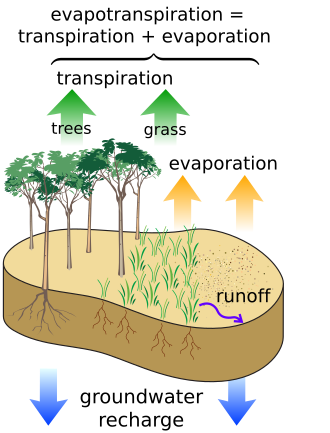Groundwater


Groundwater is the water located beneath the Earth's surface in soil pore spaces and in the fractures of rock formations. A unit of rock or an unconsolidated deposit is called an aquifer when it can yield a usable quantity of water. The study of groundwater is called hydrogeology.
Groundwater is recharged from, and eventually flows to, the surface naturally; natural discharge often occurs at springs and seeps, and can form oases or wetlands. Groundwater is also often withdrawn for agricultural, municipal, and industrial use by constructing and operating extraction wells. The study of the distribution and movement of groundwater is hydrology, particularly aquifer hydrology.
Characteristics[edit]
Groundwater flows due to the force of gravity and the pressure differences in the water itself. Its movement is significantly slower than the flow of water in rivers or streams, due to the porosity of subsurface materials. Groundwater can be involved in the natural process of water cycle (also known as the hydrological cycle), where it plays a vital role in the subsurface part of the cycle.
Aquifers[edit]
An aquifer is a layer of porous substrate that contains and transmits groundwater. When water can flow directly between the surface and the saturated zone of an aquifer, the aquifer is unconfined. The deeper parts of unconfined aquifers are usually more saturated since gravity causes water to flow downward. The upper surface of the saturated zone is called the water table or phreatic surface. Below the water table, where in general all pore spaces are filled with water, is the phreatic zone.
Confined aquifers are those in which an impermeable dirt/rock layer exists that prevents water from seeping into the aquifer from the ground surface located directly above. Instead, water seeps into confined aquifers from farther away, where the impermeable layer ends or is breached by a fault. Water in confined aquifers is under increased pressure compared to the water in unconfined aquifers. This can create artesian wells that flow freely without the need for pumping.
Groundwater Quality[edit]
The quality of groundwater, which can be affected by the geological composition of the aquifer, the residence time of the water, and the quality of the recharged water, is an important concern. Contaminants from human activities, such as industrial waste, agricultural chemicals, and improper disposal of waste, can also affect groundwater quality. Processes like filtration, dilution, and biodegradation can naturally attenuate some contaminants, but others may persist in the environment for long periods, posing risks to drinking water supplies and ecosystems.
Groundwater Management[edit]
Effective management of groundwater resources is critical for ensuring sustainable water supply and protecting the natural environment. This involves monitoring groundwater levels and quality, regulating the location and amount of groundwater extraction, and protecting recharge areas. Groundwater management is a challenge that requires balancing the needs of different users while protecting the aquifer from overuse and contamination.

This article is a environment-related stub. You can help WikiMD by expanding it!
Ad. Transform your life with W8MD's Budget GLP-1 injections from $75


W8MD offers a medical weight loss program to lose weight in Philadelphia. Our physician-supervised medical weight loss provides:
- Weight loss injections in NYC (generic and brand names):
- Zepbound / Mounjaro, Wegovy / Ozempic, Saxenda
- Most insurances accepted or discounted self-pay rates. We will obtain insurance prior authorizations if needed.
- Generic GLP1 weight loss injections from $75 for the starting dose.
- Also offer prescription weight loss medications including Phentermine, Qsymia, Diethylpropion, Contrave etc.
NYC weight loss doctor appointmentsNYC weight loss doctor appointments
Start your NYC weight loss journey today at our NYC medical weight loss and Philadelphia medical weight loss clinics.
- Call 718-946-5500 to lose weight in NYC or for medical weight loss in Philadelphia 215-676-2334.
- Tags:NYC medical weight loss, Philadelphia lose weight Zepbound NYC, Budget GLP1 weight loss injections, Wegovy Philadelphia, Wegovy NYC, Philadelphia medical weight loss, Brookly weight loss and Wegovy NYC
|
WikiMD's Wellness Encyclopedia |
| Let Food Be Thy Medicine Medicine Thy Food - Hippocrates |
Medical Disclaimer: WikiMD is not a substitute for professional medical advice. The information on WikiMD is provided as an information resource only, may be incorrect, outdated or misleading, and is not to be used or relied on for any diagnostic or treatment purposes. Please consult your health care provider before making any healthcare decisions or for guidance about a specific medical condition. WikiMD expressly disclaims responsibility, and shall have no liability, for any damages, loss, injury, or liability whatsoever suffered as a result of your reliance on the information contained in this site. By visiting this site you agree to the foregoing terms and conditions, which may from time to time be changed or supplemented by WikiMD. If you do not agree to the foregoing terms and conditions, you should not enter or use this site. See full disclaimer.
Credits:Most images are courtesy of Wikimedia commons, and templates, categories Wikipedia, licensed under CC BY SA or similar.
Translate this page: - East Asian
中文,
日本,
한국어,
South Asian
हिन्दी,
தமிழ்,
తెలుగు,
Urdu,
ಕನ್ನಡ,
Southeast Asian
Indonesian,
Vietnamese,
Thai,
မြန်မာဘာသာ,
বাংলা
European
español,
Deutsch,
français,
Greek,
português do Brasil,
polski,
română,
русский,
Nederlands,
norsk,
svenska,
suomi,
Italian
Middle Eastern & African
عربى,
Turkish,
Persian,
Hebrew,
Afrikaans,
isiZulu,
Kiswahili,
Other
Bulgarian,
Hungarian,
Czech,
Swedish,
മലയാളം,
मराठी,
ਪੰਜਾਬੀ,
ગુજરાતી,
Portuguese,
Ukrainian